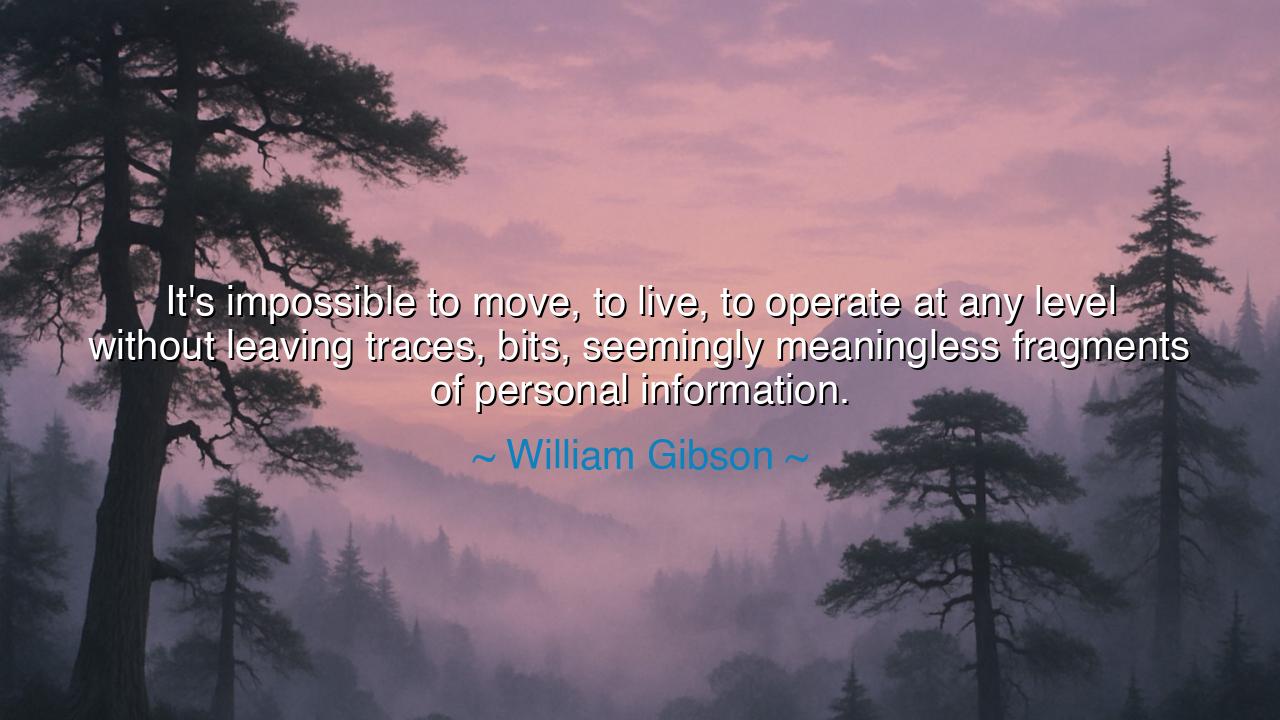
It's impossible to move, to live, to operate at any level
It's impossible to move, to live, to operate at any level without leaving traces, bits, seemingly meaningless fragments of personal information.






When William Gibson, the visionary who first named cyberspace, declared, “It’s impossible to move, to live, to operate at any level without leaving traces, bits, seemingly meaningless fragments of personal information,” he was not only describing the world of computers—he was unveiling a truth about the digital age itself. His words echo like a prophecy: that every step we take, every gesture, every glance online or offline, leaves behind a trail, faint to the eye but powerful to those who know how to read it. In ages past, a footprint in the sand betrayed a traveler; now, the footprint is made of data, scattered endlessly across the fabric of the web.
The meaning of Gibson’s words lies in the inevitability of exposure. No one who lives in a connected world can move unseen. Each purchase leaves a record, each message a copy, each visit to a page a trace upon a server. These fragments may seem meaningless, but in their gathering they reveal the shape of our lives. Just as an archaeologist can rebuild the story of an empire from broken pottery and faded carvings, so too can modern watchers reconstruct the lives of men from the bits we scatter daily. Thus Gibson warns us: to exist is to leave a shadow.
History itself offers a chilling mirror of this truth. Consider the fall of East Germany and the uncovering of the Stasi archives. The secret police kept countless scraps of information on ordinary citizens—notes, whispers, fragments of overheard speech. Individually they seemed trivial, but together they built webs of suspicion and control. What the Stasi did with paper and ink in a single country, the digital world now does automatically, across the globe, and at a scale the ancients could never have imagined. Gibson’s words capture this new condition: we are all documented, whether we wish it or not.
Yet his insight is not solely a warning of tyranny; it is also a revelation of interconnectedness. These traces we leave are also how we connect, how we are known, how communities and networks are woven. Without leaving signs of ourselves, we could not be remembered, nor could we find one another across the vastness of the digital ocean. The fragments of information are both vulnerability and gift: they can expose us, but they can also make us visible to those who seek us in love, in knowledge, in shared purpose.
Still, Gibson’s words bear the weight of caution. For what is scattered without thought can be gathered without mercy. The bits we leave behind may be harvested by corporations, governments, or thieves, turned against us in ways we cannot foresee. In this way, our very lives become commodities, bought and sold in markets we never see. What we call “meaningless” may, in other hands, be the very key to our identity, our habits, our future. Thus the wise must learn to walk carefully, not in fear, but in awareness.
O seekers of wisdom, take this lesson deeply into your heart: you cannot live without leaving traces, but you can choose which traces to leave. Be mindful of what you reveal. Share consciously, guard your private self, and remember that each action in the digital realm is a seed that may bloom far beyond your intent. Learn to master your traces, lest your traces master you.
Therefore, let Gibson’s words be both lantern and warning: “It’s impossible to move, to live, to operate at any level without leaving traces.” Do not be naïve and believe yourself invisible, nor be paralyzed by fear of exposure. Instead, walk the middle path—wise, intentional, and discerning. Shape the fragments you leave so they reflect not weakness but strength, not carelessness but integrity. For in this age of eternal memory, what you scatter will one day be the story of who you were.






AAdministratorAdministrator
Welcome, honored guests. Please leave a comment, we will respond soon